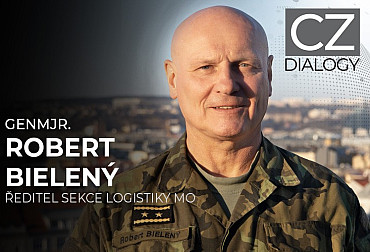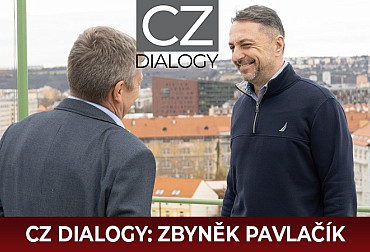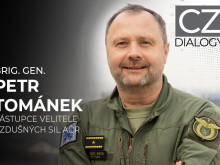A new look at defence and security: Innovation and start-ups
The unique concept of the Future Forces Forum 2024 offered an excellent opportunity for exhibitors to showcase their latest technologies and solutions and discuss key national and global security objectives through exhibitions, expert panels, annual NATO working group meetings, and other networking events.
Video: A new look at defence and security: Innovation and start-ups / CZ DEFENCE
As previously mentioned, the prominence of unmanned and autonomous vehicles—as well as protective systems to counter them—highlights current trends in defence and security technologies. The development work of young scientists and the integration of their innovative solutions may find applications in military armaments and the protection of critical targets.
Our next discussion installment will focus on this topic. For instance, we spoke with Vojta Roček, partner of the Presto Tech Horizons Fund; Pavel Čumpelík, Development Manager of AGC; Tomáš Orlík, CEO of Skyline; and Jan Lukačevič, head of the Prague Innovation Institute’s Moving to Aerospace project.
According to Vojta Roček, the Future Forces Forum exhibition is invaluable because every startup must first know how to sell its product, which involves understanding its market. "Where else but here can I see what well-known manufacturers are trying to offer armies and gauge the market situation? I can then better communicate this to startups and work with them to adjust their strategies for success," Roček shares in the interview.

He said the defence sector is a good opportunity and its interest will continue to grow. "I ask anyone who doubts this a simple question, do they expect the next 5 years to be safer than the previous 5 years. And no one can answer yes to that. So I think anything that helps us defend Western values is great and defence is the obvious choice," says Vojta Roček.
The establishment of the Presto Tech Horizons capital fund in partnership with the Czechoslovak Group (CSG) demonstrates this concept. "We founded it specifically to combine CSG’s extensive defence knowledge with our expertise in startups, supporting the most promising in this area," explains Vojta Roček of the Presto Tech Horizons Fund. The fund has reviewed over 1,200 presentations to date, shortlisted twenty-five, and plans to announce its first five projects soon. "It’s about supporting a startup focused on echolocation of flying projectiles and an application built on it. There’s also a software startup that aids combat operations management, as well as one in predictive maintenance—an area we're very interested in because making infrastructure and logistics work effectively is essential for militaries in the 21st century. Additionally, we’re supporting several AI startups in defence, which we find very promising," Roček says, highlighting some of the fund’s most interesting projects.
One of the innovators is AGC Glass Europe, whose representatives at the Future Forces Forum presented electromagnetically shielded glass. This technology is based on the company's expertise in antenna systems and electromagnetic signal propagation, providing a novel solution for preventing eavesdropping and enhancing the resilience of digital and defense systems against traffic disruption or data theft. "Given the advancement of transparent shielding in terms of performance and the possibility of combining it with other features, such as ballistic or blast resistance, this technology is well-suited for use in this sector," says AGC's development manager, Pavel Čumpelík. The cyber domain is very dynamic and rapidly evolving, so we were curious how long this solution could withstand future threats. "If you want to protect systems, whether software or hardware or a combination, obsolescence is often inevitable. Software defenses, for example, can become obsolete quickly because a new attack vector might emerge tomorrow. With this glass, we are essentially aligning with the technological roadmaps of telecommunications, development, and hardware industries. This technology has a timeless framework," explained Pavel Čumpelík, detailing AGC Glass Europe's innovative solutions.

Another company, Skyline Europe, specializes in creating and processing 3D data for simulations. "The data produced by Skyline's software is used in systems for battle management and tactical mission planning," says the company's CEO, Tomáš Orlík. Approximately 70% of its solutions are used by militaries worldwide, but the company also serves the commercial sector. Its largest traditional customer is the U.S. Army, with whom the company has collaborated on mapping projects for over 20 years. "In fact, that’s why the company moved its headquarters to Herndon, U.S., about 20 years ago. Today, we’re an American company, though all the software continues to be developed in Israel, so our roots remain Israeli. All developers are based in Tel Aviv, while business and project management are in the United States. The Israeli military is now a major client, and in Europe, the Bundeswehr and the Romanian and Hungarian armies use our solutions," says Orlík.

The Prague Innovation Institute (PII) is an organization established by the Prague City Council to manage innovation within Prague. It is responsible for updating and implementing the Regional Innovation Strategy. Jan Lukačevič heads the "Moving to Aerospace" project at PII, for which he serves as the lead.
At this year’s Future Forces Forum, he presented PII's achievements and facilitated networking among various innovative companies and startups. A special focus of our discussion was on space. "I see space as an operational domain, and we’re working to drive innovation in this field so that key players are aware of each other. Companies often don’t collaborate enough, and this is one of our core roles. We work to ensure everyone knows one another. For example, we encourage companies to establish collaborations, join consortia, participate in international projects, and find partners abroad," explains Lukačevič. The focus is on fostering cooperation across the region. "We work with established companies and with startups that need a little nudge to get off the ground, as well as with students who have ideas but lack direction," Lukačevič adds.

The key players in developing these projects are the investors who bring the most successful solutions into the real world. "This is something we've identified over the past year and a half as, let's say, one of the biggest challenges in our environment. There is relatively little private capital here. We're now patiently working to explain to private equity investors and venture capital funds that aerospace and biotechnology are areas worth investing in, that this isn't such high-risk capital. We often encounter a lack of specialized knowledge on the part of venture capital funds, and it's necessary to mediate communication between companies and startups to clarify what’s involved," says Jan Lukačevič of the Prague Innovation Institute in an interview.
You can watch the complete interviews with representatives from selected companies at the beginning of the article.





















